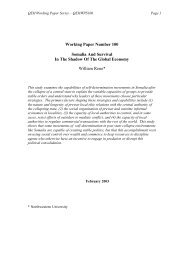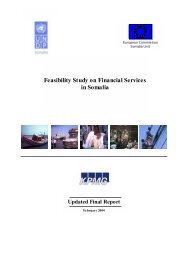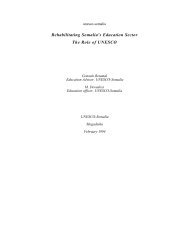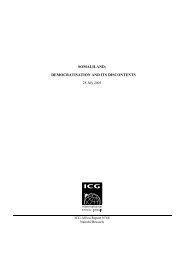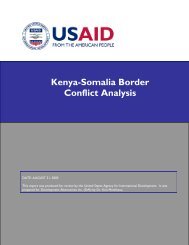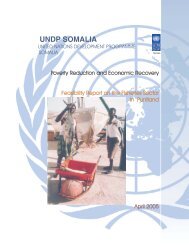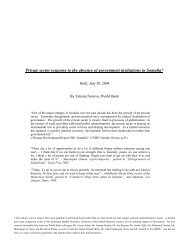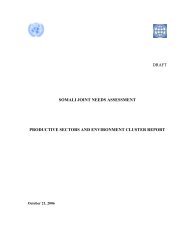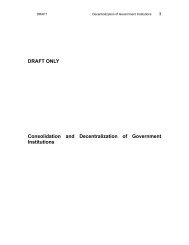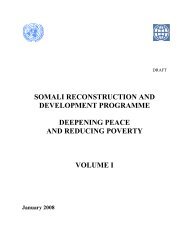Primary Education Survey Evaluation Report Somalia - Somali - JNA
Primary Education Survey Evaluation Report Somalia - Somali - JNA
Primary Education Survey Evaluation Report Somalia - Somali - JNA
You also want an ePaper? Increase the reach of your titles
YUMPU automatically turns print PDFs into web optimized ePapers that Google loves.
PES <strong>Evaluation</strong> <strong>Report</strong>, 2008<br />
• Validating data collection and data cleaning;<br />
• Data entry processes;<br />
• Data analysis;<br />
• <strong>Report</strong> generation;<br />
• The design of future data needs, and;<br />
• The integration of various data collection strategies currently undertaken.<br />
These components should be addressed as capacity and resources are developed. It would not be<br />
appropriate for capacity in all these areas to be developed simultaneously. An immediate focus should be<br />
placed on improving data collection processes to ensure greater accuracy, and shifting data entry<br />
responsibility to Zones over a two to three year period.<br />
The issue of data entry is clearly the next phase in developing ownership of the PES. The issue caused<br />
much comment from Ministry officials. One observed:<br />
Further<br />
The Process of data entry has to be owned by ministry. The computers are available, but<br />
human resources are the problem. People are available but need some support. UNICEF<br />
will have to pay for the EMIS counterpart.<br />
Those who enter data are not <strong>Somali</strong> and therefore they do not know local language and<br />
conditions. Need to involve local people in data entry. Can they enter once and the<br />
Nairobi people enter once. Then compare. Do this to build experience. Even take <strong>Somali</strong><br />
data entry people to Nairobi for the process.<br />
It was mentioned above that data collecting, processing and analysis skills are emerging in Puntland.<br />
However, this is not consistent across the three Zones. Some capacity building in the area of data entry<br />
and accessing data has been attempted; computers have been supplied and staff to undertake the tasks<br />
have been identified. However, there are constraints in the system that are preventing the transition of<br />
responsibility from UNICEF to the MoEs. Both the education literature and the change literature will<br />
indicate that a brief workshop on a complex set of skills is not enough to build capacity for people to<br />
operate independently in a new and challenging area. In addition to the training component, the skills<br />
need to be practiced in a supportive environment. While experience and support has been provided for in<br />
the area of data collection it has not been provided in the other component areas of EMIS development.<br />
This is essential if capacity is to be developed. With the current double entry data system the opportunity<br />
exists to develop capacity in the area of data entry, without substantial risk to the project. The MoE data<br />
entry staff could be used to enter the data once and the Nairobi data entry staff enter it the second time.<br />
This would be followed by the usual comparison check and corrections. The precise location of the data<br />
entry function would need to be decided, but the process would provide data entry staff with experience<br />
in a supportive environment. As capacity is demonstrated, responsibility for both data entry tasks should<br />
be shifted to Zones.<br />
3.2 Recommendations<br />
a. That the responsibility for transferring of EMIS components to MoEs are considered one at a time<br />
as capacity and resources are developed. In this way a smooth transition from the centrally<br />
managed survey to a decentralised EMIS can be achieved.<br />
b. That responsibility for data entry be shifted to Zones over a two to three year period.<br />
c. That initially MoE data entry staff be used to enter the data once and that the Nairobi data entry<br />
staff enter it the second time.<br />
26



